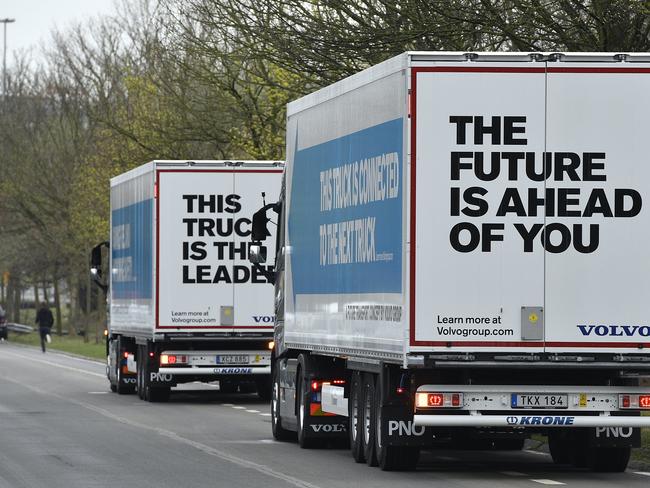The jobs killer is coming: How driverless trucks could change Australia
ONE of the most exciting tech advances on the horizon could have dire consequences for Australia, ripping communities apart.

IT’S one of the most exciting technological advances on the horizon, but the arrival of driverless vehicles could devastate Australia.
As a nation whose economy revolves around a $200 billion transport and logistics industry, waving goodbye to truck drivers could mean far-reaching effects.
After a futuristic fleet of self-driving “smart trucks” drove across Europe from Sweden to the Netherlands earlier this month, TechCrunch predicted, “no technology will automate away more jobs — or drive more economic efficiency.”
With robot drivers who don’t need to eat or sleep, our trucks will be carrying goods at breakneck speeds within decades. It will cut time and costs, but could prove to be a crushing blow for the country’s finances.
It’s not just drivers who will be out of jobs. Businesses linked with truck drivers and the roadside will struggle or close too, from service stations to petrol stations to cafes to motels.
“The outlook for the transport sector is closely tied to the outlook for the broader economy,” the Australian Industry group reported in November 2012. “Practically all of the goods produced in the Australian economy need to be transported to a final consumer. Not surprisingly, growth in the Australian transport sector typically tracks closely to GDP growth.”

‘RIPPING APART THE COMMUNITY’
With South Australia hosting the nation’s first trial of self-driving cars on public roads this November, the Transport Workers’ Union is calling on the Federal Government to adopt a strategy to deal with this kind of new technology.
As the likes of Tesla’s Elon Musk rave about how “autonomous vehicles” are safer, more practical and just two years away, the TWU says Australia needs to ready for their impact on our lives.
“We need a strategy to decide whether we are willing to accept a future where many of the jobs humans currently undertake will potentially be obsolete, such as jobs involving driving,” said TWU National Secretary Tony Sheldon.
“Prime Minister Malcolm Turnbull has said it is an exciting time to be an Australian given technological advances but this excitement must provide more than just a geek economy of foreign and Australian billionaires reaping huge profits whilst ripping apart the community.”
He admitted there could be advantages to the designs under development by Uber, Google, Apple, but our friends and family members would be the ones to suffer.
“They are hard-working members of our communities who will need quality employment in the future,” he said. “Anything less abandons them, their loved ones and future generations.”

NO JOBS, NO RIGHTS
The TWU is also concerned about what new technologies could mean for our rights.
“Companies such as Uber are lowering labour standards by stealth by employing drivers as independent contractors without any of the benefits that generations of Australians have had, such as rights to sick leave, annual leave, maternity leave, retirement with dignity, minimum pay and protections against unfair dismissal,” said Mr Sheldon.
“Uber is undercutting the already poor labour standards which exist in the taxi industry. We should be lifting standards, not allowing them to be reduced even further.
“We also urgently need a strategy to decide where quality jobs in the future will come from.”
Not only could we be left without jobs, there are concerns about supposedly foolproof technology causing chaos in our vital industries. The Europe experiment involved “truck platooning”, with two or three vehicles driven in convoy connected via wireless, with the leading truck determining route and speed.
They were still semi-automated, with human drivers required despite computers doing the driving, and advocates admitting certain issues still needed to be ironed out.
“Safety issues will not be eliminated given that technology is not infallible,” said Mr Sheldon, pointing to recent problems at Australian banks that saw customers unable to use ATMs and online services. “There is also the inevitable catastrophic mismanagement of driverless vehicles, which will no doubt occur just as currently some heavy vehicles are not maintained properly, leading to fatalities.”
Problems with this technology could mean disaster on a larger scale too, with unmanned drones and warships replacing human-operated weapons.
The world will need to make some dramatic changes to adapt to its driverless new reality.



